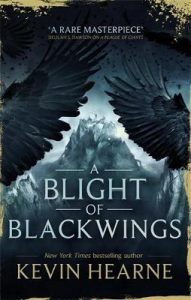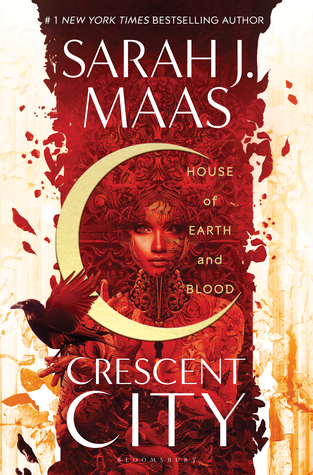 House of Earth and Blood (Crescent City, #1) by Sarah J. Maas
House of Earth and Blood (Crescent City, #1) by Sarah J. Maas Format: audiobook, ebook
Source: purchased from Amazon, purchased from Audible
Formats available: hardcover, paperback, ebook, audiobook
Genres: epic fantasy, fantasy, fantasy romance, paranormal, science fiction, urban fantasy
Series: Crescent City #1
Pages: 803
Published by Bloomsbury Publishing on March 3, 2020
Purchasing Info: Author's Website, Publisher's Website, Amazon, Barnes & Noble, Kobo, Bookshop.org
Goodreads
Bound by blood.Tempted by desire.Unleashed by destiny.
Bryce Quinlan had the perfect life—working hard all day and partying all night—until a demon murdered her closest friends, leaving her bereft, wounded, and alone. When the accused is behind bars but the crimes start up again, Bryce finds herself at the heart of the investigation. She’ll do whatever it takes to avenge their deaths.
Hunt Athalar is a notorious Fallen angel, now enslaved to the Archangels he once attempted to overthrow. His brutal skills and incredible strength have been set to one purpose—to assassinate his boss’s enemies, no questions asked. But with a demon wreaking havoc in the city, he’s offered an irresistible deal: help Bryce find the murderer, and his freedom will be within reach.
As Bryce and Hunt dig deep into Crescent City’s underbelly, they discover a dark power that threatens everything and everyone they hold dear, and they find, in each other, a blazing passion—one that could set them both free, if they’d only let it.
With unforgettable characters, sizzling romance, and page-turning suspense, this richly inventive new fantasy series by #1 New York Times bestselling author Sarah J. Maas delves into the heartache of loss, the price of freedom—and the power of love.
My Review:
In the beginning there is Bryce Quinlan and Danika Fendyr. And in the end, there is Bryce Quinlan and Danika Fendyr, linked together by their hearts and the translation of a tattoo on both of their backs, “Through love, all is possible.”
That’s the way it begins, and that’s the way it ends. In between, there’s a long walk through very dark places that Bryce is forced to take alone. Or so she thinks. Or so it seems.
Ultimately, House of Earth and Blood is a story about love. Not just romantic love, although there is a slow-burn romance at the heart of this story. But the romance at the true soul of this saga is not Eros, as the Ancient Greeks called sexual passion, but rather the deep friendship of the soul that they named Philia.
What seems like a star-crossed romance between the half-human, half-fae and barely magical Bryce Quinlan and the fallen angel Hunt Athalar is the stuff of which Romeo and Juliet tragedies are made. The deepening angst of their enemies into lovers story gives this saga both its biting wit and its too-frequent descents into over-the-top melodrama.
But it’s Bryce and Danika’s sisters-of-choice, bone-deep connection that gives this story its lowest depths of despair – and its wings.
Once upon a time, when my parents were still among the living and we used to play cards together, at the end of hand someone would frequently say, “Read ‘em and weep.” In a nutshell, that’s House of Earth and Blood.
Read it and weep.
Escape Rating B-: There were points during my reading/listening of this book that I just couldn’t stand not knowing what came next so I dove from the audio right into the ebook the minute I got home.
And there were times when I was ready to throw the thing against the wall and end the torture because there were so many things that just drove me crazy. That I was considering this course of behavior in the car, listening to my iPhone while I was driving shows just how tempted I was.
So I’m not remotely neutral about any of this. Not at all.
The short version of this review is that the first 100 pages were terrific and ended in a gut wrenching drop. The last 100 pages were so damn compelling that I couldn’t wait to finish in audio THEN couldn’t flip pages fast enough.
Much of that final 100 page compulsion was provided by a clichéd villain exposition to make the heroine see just how brilliant his villainy had been, but the reader – and every other character in the story – needed to hear it. But villain clichés are still villain clichés.
In the middle there were 600 pages that would have been better as 400 or 450 pages. A metric fuckton of stuff happened, a lot of it was stuff the reader really, really needed to know. But there was also an equally metric fuckton of over-the-top angst that may have needed to happen but didn’t need to happen with that many repeats or nearly that much overblown language and description.
My feelings about this book are absolutely in the category of splinters up the ass fence sitting. The parts I loved, I really, really loved. The parts that I hated, I hated just about as much. There’s no middle ground here that isn’t a quagmire of blood, sweat, tears and angst.
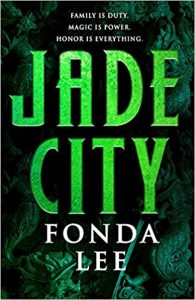 Initially, what dragged me into this story was the sheer complexity of the worldbuilding. This is not a place I’d EVER want to live, because it is seriously fucked up – especially for the original recipe humans – but the mixture of 21st century technology with high-powered magic and authoritarian rule by powerful immortals blends into a world that is both easy to envision and fascinating to explore.
Initially, what dragged me into this story was the sheer complexity of the worldbuilding. This is not a place I’d EVER want to live, because it is seriously fucked up – especially for the original recipe humans – but the mixture of 21st century technology with high-powered magic and authoritarian rule by powerful immortals blends into a world that is both easy to envision and fascinating to explore.
The vibe of Crescent City and its world feels very much like the heady aura of the organized menace of power and magic that permeates Fonda Lee’s marvelous Jade City, the first book in her Green Bone Saga.
As much as the way this world works reminded me of Jade City, in the end it read like a whole bunch of recent SF/Fantasy worlds thrown into a gigantic blender set on high. The resulting mélange is generally pretty tasty, and I found the depth of the worldbuilding to be the strongest part of the book.
Especially considering that, as much as this reads like an urban fantasy in a high fantasy setting for much of the story – rather like the Chronicles of Elantra by Michelle Sagara (start with Cast in Shadow), technically this is science fiction of the “walks like a duck, quacks like a duck, but isn’t a duck,” variety. Like A Chorus of Dragons by Jenn Lyons, where it turns out that the gods aren’t really gods, but rather immortals who came from another planet. Although Lyons sends the world of her series careening off its tracks in an entirely different way. Still, if you like The House of Earth and Blood and can’t wait for the next book, check out The Ruin of Kings.
As much as I loved the beginning of this book, and found the ending to be utterly riveting, the middle sagged and bagged.
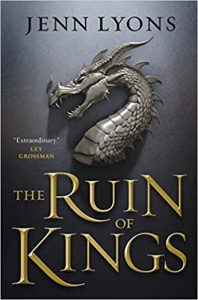 Some of that was language. It felt like all of the physical descriptions of people were repeated whenever they appeared, over and over and over. And it was very obvious that all of the people in this story were all extremely conventionally attractive. But all of the descriptions were overblown, something that was particularly obvious in audio.
Some of that was language. It felt like all of the physical descriptions of people were repeated whenever they appeared, over and over and over. And it was very obvious that all of the people in this story were all extremely conventionally attractive. But all of the descriptions were overblown, something that was particularly obvious in audio.
There was also a lot of wordy, emo, angsty, over-the-top emotionalism, particularly on Bryce’s part that I found teeth-gnashing. It made it very clear that she still had a tremendous amount of growing up to do, to the point of really making me wonder about the developing relationship between Bryce and Athalar with its 200 year age gap.
But the entire middle section felt like it had three purposes. Build that romantic relationship – only to cockblock it at every turn, watch Bryce get beaten down and run around at every single turn, and follow Bryce and Athalar as they conduct an investigation that is doomed to fail because there’s a villain they don’t know about hiding behind the metaphorical curtain. Leading right back to that clichéd villain exposition.
All of those things needed to happen, but the runaround was long and repetitive. It also drove home that this is a “power corrupts and absolute power corrupts absolutely” story, as it seems that every single system and authority is determined to remind Bryce that she is the lowest of the low – and so is nearly everyone else.
There was a hateful sameness to all of the powerful people in this story. While power does corrupt, it doesn’t necessarily corrupt every villain with exactly the same blend of total inability to see anyone else – even their own families – as having any value whatsoever AND utter sadism. Some powerful people would be savvy enough to at least hide their ugly a bit better and at least a few would manage to be slightly enlightened even if that enlightenment is because it’s ultimately in their own self interest to at least seem benevolent.
And we don’t know why they are ALL this way. Villains never think they are the villain, after all. So what’s their story? The sheer number of times that one of the many, many villains reveled in their ability to mentally and/or physically torture others was initially sickening and then it just got old.
Before this review – or rant – goes on as long as the book it covers, one final thought. I loved, and hated, and loved this book by turns. But I never stopped thinking about it – even when I wanted to. It’s compelling when it’s good and it’s compelling when it’s crazy.
But it ended on an incredible high note, to the point where, as much as it drove me round the twist, I know that I’ll be compelled to pick up the second book in the series when it comes out (hopefully) next year. I’m pretty sure this is going to be a story where things get darkest just before they turn completely black – BUT I HAVE TO KNOW!

 Murder by Other Means (The Dispatcher #2) by
Murder by Other Means (The Dispatcher #2) by  Escape Rating A: John Scalzi has a very fine line in snark. In fact, his snarkitude is a good chunk of what I read him – or in this case listen to him – FOR. His characters generally do a marvelous chuckle-with-a-grimace job at making me chuckle with that grimace, because they manage to say all the clever things that most of us figure out long after a conversation is done while said conversation is still going on – when that smart-aleck-ness can be delivered with full force – even if it’s just within the confines of the characters own head.
Escape Rating A: John Scalzi has a very fine line in snark. In fact, his snarkitude is a good chunk of what I read him – or in this case listen to him – FOR. His characters generally do a marvelous chuckle-with-a-grimace job at making me chuckle with that grimace, because they manage to say all the clever things that most of us figure out long after a conversation is done while said conversation is still going on – when that smart-aleck-ness can be delivered with full force – even if it’s just within the confines of the characters own head.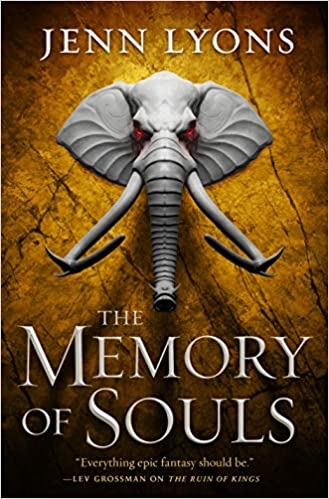 The Memory of Souls (A Chorus of Dragons, #3) by
The Memory of Souls (A Chorus of Dragons, #3) by 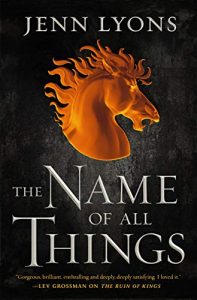 Escape Rating A++: Last year’s entry in this series,
Escape Rating A++: Last year’s entry in this series, 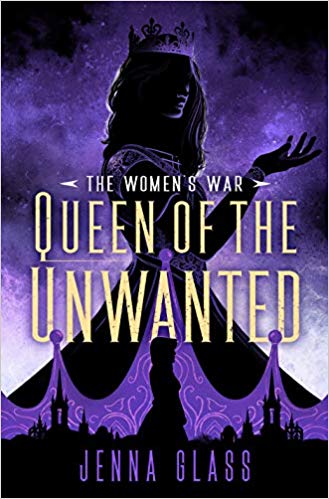 Queen of the Unwanted by
Queen of the Unwanted by 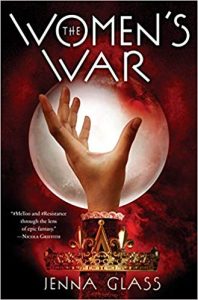 I picked up this book because for the most part I enjoyed the starting book in this series, The Women’s War. But I have to say that I found the message of that first book to sometimes be heavy-handed. Not enough to spoil my enjoyment, but more than enough to make me wonder what would happen next.
I picked up this book because for the most part I enjoyed the starting book in this series, The Women’s War. But I have to say that I found the message of that first book to sometimes be heavy-handed. Not enough to spoil my enjoyment, but more than enough to make me wonder what would happen next. Or at least, not until the very end, when the action suddenly proceeds apace, only to leave readers with multiple terrible book hangovers as they wait for the next book. Whenever it appears. I listened to 80% of this and then read the rest. The audio was interesting enough to keep me occupied while driving, but when things picked up I couldn’t stand to continue at that slow pace.
Or at least, not until the very end, when the action suddenly proceeds apace, only to leave readers with multiple terrible book hangovers as they wait for the next book. Whenever it appears. I listened to 80% of this and then read the rest. The audio was interesting enough to keep me occupied while driving, but when things picked up I couldn’t stand to continue at that slow pace.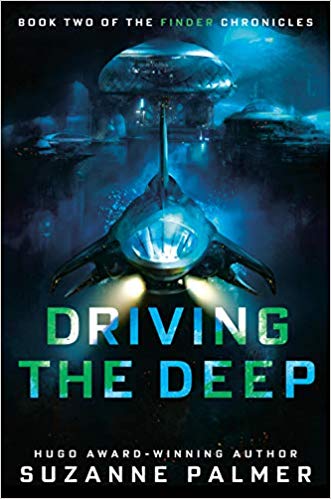 Driving the Deep (Finder Chronicles, #2) by
Driving the Deep (Finder Chronicles, #2) by 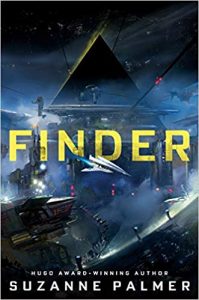 Escape Rating A-: I picked this up because I loved the first book in the
Escape Rating A-: I picked this up because I loved the first book in the 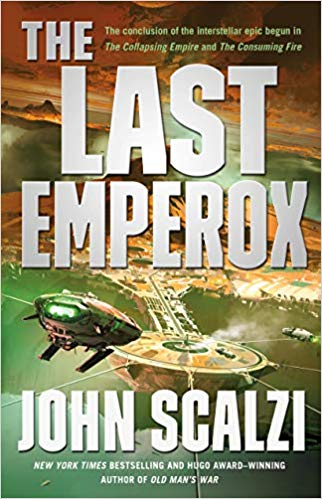 The Last Emperox (The Interdependency, #3) by
The Last Emperox (The Interdependency, #3) by  Making it all the more amazing that when this story began, with the writing of the first book in the series,
Making it all the more amazing that when this story began, with the writing of the first book in the series, 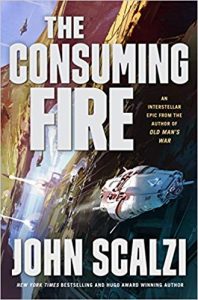 Escape Rating A+: I had a terrible approach/avoidance issue with this book. A part of that was because I had originally intended to listen to it, as I have to the entire rest of the series. The walking profanity explosion that is Kiva Lagos is best appreciated in audio. She just doesn’t have the same impact when reading the book yourself. Also, Wil Wheaton has done a fantastic job with the series, including this entry. But I normally listen while driving, or while on a treadmill at the gym, and everything has been closed. I had more time for reading but fewer opportunities for listening. In the end I mostly played Solitaire and just let the audio wash over me. It was marvelous.
Escape Rating A+: I had a terrible approach/avoidance issue with this book. A part of that was because I had originally intended to listen to it, as I have to the entire rest of the series. The walking profanity explosion that is Kiva Lagos is best appreciated in audio. She just doesn’t have the same impact when reading the book yourself. Also, Wil Wheaton has done a fantastic job with the series, including this entry. But I normally listen while driving, or while on a treadmill at the gym, and everything has been closed. I had more time for reading but fewer opportunities for listening. In the end I mostly played Solitaire and just let the audio wash over me. It was marvelous.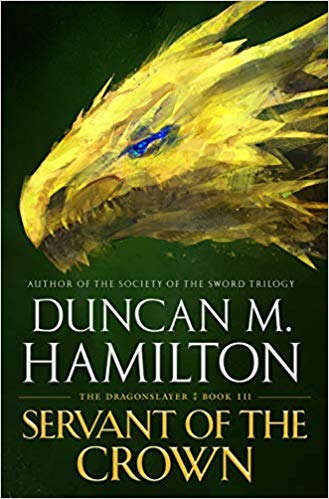 Servant of the Crown by
Servant of the Crown by 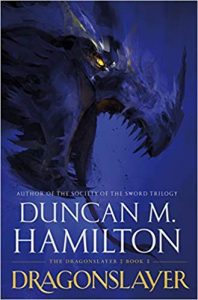 First things first. I just want to say what a treat it was to start a series, fall in love with it, and be able to just read – or be read to – all the way through to the end without having to wait months if not years for the later books in a series. I don’t always have that opportunity, either because I fall in love with the first book long before the others are out, or because I run into the “so many books, so little time” conundrum and have to space things out because of other reading commitments. Because I waited to start the first book (
First things first. I just want to say what a treat it was to start a series, fall in love with it, and be able to just read – or be read to – all the way through to the end without having to wait months if not years for the later books in a series. I don’t always have that opportunity, either because I fall in love with the first book long before the others are out, or because I run into the “so many books, so little time” conundrum and have to space things out because of other reading commitments. Because I waited to start the first book (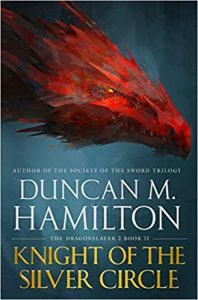 Soléne is that young hero. Gill’s the one out in front to collect all the glory and fight all the battles, or so it seems. But she’s every bit the hero that he is, just from behind the scenes. Her power is huge, but it is also quiet. She’s the mage who operates in the shadows, not because she’s the woman inspiring the hero, but because the power she wields works best from the dark – and the quiet. He knows that she brought him the victory, and he knows that the best thing he can do for her is to acknowledge that privately and not publicly. Not that the Crown won’t give her its own semi-public acknowledgements. Maybe. If they succeed.
Soléne is that young hero. Gill’s the one out in front to collect all the glory and fight all the battles, or so it seems. But she’s every bit the hero that he is, just from behind the scenes. Her power is huge, but it is also quiet. She’s the mage who operates in the shadows, not because she’s the woman inspiring the hero, but because the power she wields works best from the dark – and the quiet. He knows that she brought him the victory, and he knows that the best thing he can do for her is to acknowledge that privately and not publicly. Not that the Crown won’t give her its own semi-public acknowledgements. Maybe. If they succeed.
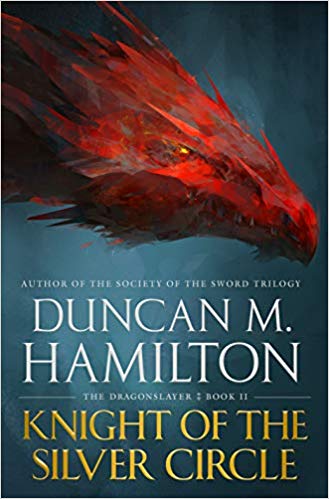 Knight of the Silver Circle by
Knight of the Silver Circle by 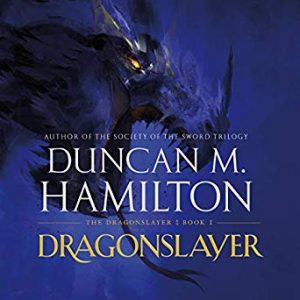 I want to call Guillot dal Villerauvais an antihero, because if there’s one thing the man does not want to be, it’s a hero. He’s been there and done that and knows, for sure, for certain and for true, that the so-called glory is empty. As tempting as the adulation still is, he’s all too aware that it’s a cup of poison.
I want to call Guillot dal Villerauvais an antihero, because if there’s one thing the man does not want to be, it’s a hero. He’s been there and done that and knows, for sure, for certain and for true, that the so-called glory is empty. As tempting as the adulation still is, he’s all too aware that it’s a cup of poison.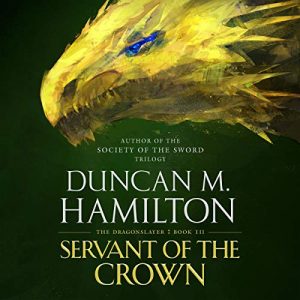 At the same time, there’s an underlying truth to this part of the saga that reminds me in a very peculiar way of Star Trek IV: The Voyage Home. If you’re not familiar, that’s the one with the whales. And Mirabaya or at least its Prince Bishop, like the Earth of that movie, is about to discover that the thing that can save them is the thing that they’ve been so successful at destroying.
At the same time, there’s an underlying truth to this part of the saga that reminds me in a very peculiar way of Star Trek IV: The Voyage Home. If you’re not familiar, that’s the one with the whales. And Mirabaya or at least its Prince Bishop, like the Earth of that movie, is about to discover that the thing that can save them is the thing that they’ve been so successful at destroying.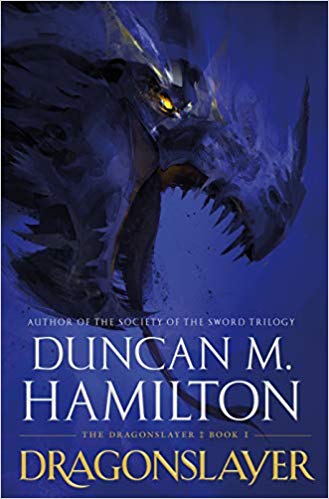 Dragonslayer by
Dragonslayer by 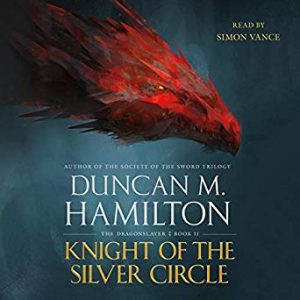 Last but not least, while this book was published in mid-2019 and probably finished sometime the previous year, finishing it today showed some striking parallels between the way that towns and villages were emptying out in hopes of getting away from the dragon and the response to the current COVID-19 pandemic in real life. In both cases, public spaces are empty and people are fearful. A virus is even harder to outrun than a flying, fire-breathing dragon.
Last but not least, while this book was published in mid-2019 and probably finished sometime the previous year, finishing it today showed some striking parallels between the way that towns and villages were emptying out in hopes of getting away from the dragon and the response to the current COVID-19 pandemic in real life. In both cases, public spaces are empty and people are fearful. A virus is even harder to outrun than a flying, fire-breathing dragon.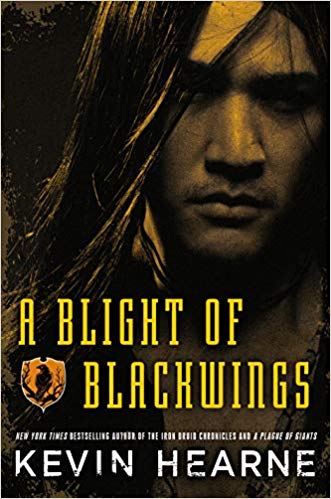 A Blight of Blackwings (Seven Kennings, #2) by
A Blight of Blackwings (Seven Kennings, #2) by 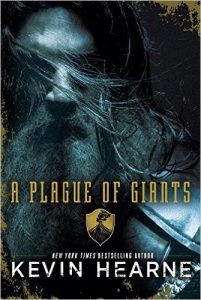 Just as in the first book in the series, the extremely awesome and utterly marvelous
Just as in the first book in the series, the extremely awesome and utterly marvelous 